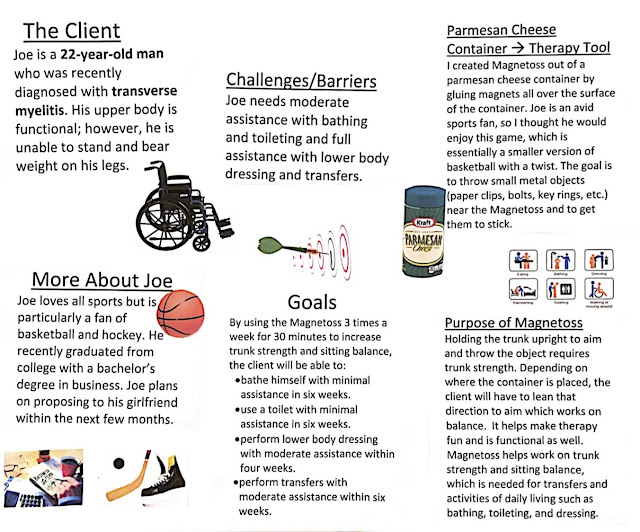Neuro Note #2
For my second neuro note, I chose a
TED Talk called Simple Hacks for Life
with Parkinson’s. TED Talks are
fabulous because they are entertaining which means that they captivate a large
audience while simultaneously being educational at the same time. Moreover, it
makes learning fun. I choose this
particular TED Talk because geriatrics is one population I may work with after
graduating from OT school. In addition, Parkinson’s disease is fairly common,
so I’m interested to learn even more about it in case anyone I know is
diagnosed with it in the future.
In the TED Talk, Mileha Soneji
talks about her experiences with her uncle, who was diagnosed with Parkinson’s
disease. She is a designer and because of
her career she was interested in making something to help people with Parkinson’s
disease live an easier life. She designed a no-spill cup that was inspired by
her uncle who couldn’t drink coffee anymore without spilling it on himself. The
cup is curved on top so when it is shaken, the liquid gets deflected back
inside the cup. She mentions that the cup she designed looks like an everyday
cup that you would find in anyone’s household and therefore, it can be used by
her uncle without standing out in a crowd. In addition, she says that everyone
can benefit from this cup. Anyone who is clumsy or doesn’t want accidental
spills in their house can utilize this design. She may not realize it, but by designing this
cup she is promoting universal design.
Soneji doesn’t
just stop with the cup, she goes onto develop another simple tool. First, she
observes how her uncle walks up and down the stairs. He is successful walking
up and down the stairs because it is a continuous motion, but he struggles
walking on flat surfaces. She creates a print out of stairs on a flat poster to
glue onto the ground. She then has her uncle walk across this flat surface with
a picture of stairs on it. Normally, it takes him a while to get from point A
to point B, but when he walked across the poster with stairs, he floated across
quickly and with ease. It’s great to see inexpensive tools to help patients
with Parkinson’s disease. She could have developed a complex expensive piece of
equipment, but instead she thought about something simpler. Sometimes expensive
gadgets aren’t always better and often aren’t affordable to most people. This shows how anyone can come up with
adaptive equipment if they are motivated to see the project through.
Soneji,
M. (2015). Simple hacks for life with Parkinson’s. [Video file]. Retrieved
from https://www.ted.com/talks/mileha_soneji_simple_hacks_for_life_with_parkinson_s#t-333488

Comments
Post a Comment